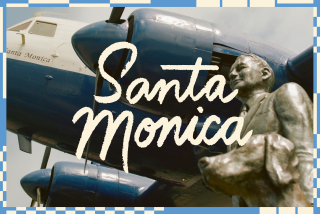Hidden Gems
- Share via
Like those ghostly footprints and missing-link hominid bones that surprise lucky paleoanthropologists in the African desert, the vestiges of L.A.’s mid-century design heritage are beacons to the urban fossil hunter. “Miramar Melmac Dinnerware,” reads the stylish if understated sign that hovers over the 710 Freeway on Ford Street in East L.A. Kicky colored plastic dishes accented with futuristic motifs may not figure prominently in the Martha Stewart kitchen, but Melmac dinnerware was quite the thing during Southern California’s postwar boom years.
Melmac is the trade name for melamine, a sturdy hard plastic developed in the World War II era by the ominous-sounding American Cyanamid Corp. For better or worse, Melmac dinnerware symbolized the postwar modernist ethos of affordable mass-produced design. From the late 1940s to the early ‘60s, hundreds of companies manufactured Melmac serving ware in Atomic Age patterns and memorable contemporary shades such as salmon and olive green. Manufacturers snagged mid-century design names such as Russel Wright (dubbed ‘The Original Modfather’ by one collector site) and Irving Harper of George Nelson Associates(creator of the sublime “Marshmallow Sofa” made by Herman Miller during the ‘50s) to create arty, sophisticated Melmac pieces that are highly collectible today.
Melmac names ranged from the fanciful-Air Flite, Harmony House, Branchell and L.A.’s own Miramar-to the ridiculous-Aztec, Rivieraware, Debonaire. All were mainstays in many a postwar kitchen, though Melmac proved vulnerable to a variety of ailments, including scratches, stains and scalding. Still, modern-day devotees calling themselves Melmaniacs troll dealers’ collections for surviving pieces, snapping up finds at prices that are respectable, if unlikely to generate an “Antiques Roadshow” gasp. On a given day you can find several Miramar Melmac pieces posted on EBay in shades of orange, aqua or pink, or perhaps in the line’s Bird of Paradise pattern (look for the manufacturer’s imprint on the underside).
The old Miramar Melmac factory on Ford Street is still bustling, though it’s no longer churning out turquoise serving bowls or plates festooned with bird of paradise motifs. La Fortaleza, a supplier of tortilla products to the restaurant industry, has been on the premises since 1980. “I think they went to Valencia,” says tortilla kingpin Ramiro Ortiz Sr. of the former occupants-although efforts to track them down in Valencia proved, well, fruitless. “However,” he points out, “what we make is still round.” “A couple of years ago someone came in and asked for the sign,” adds Ramiro Ortiz Jr. “We told them no. We like it. It’s our sign. It’s a landmark.”


